

Silicon Valley’s Singularity University Has Some Serious Reality Problems. The pitch was simple: Forget accredited graduate schools and think big at Singularity University.
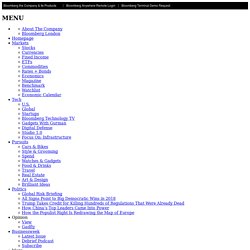
Google co-founder Larry Page and futurist Ray Kurzweil could be among your lecturers in the Graduate Studies Program at Singularity, named for the notion that humans will someday merge with machines. You’d work in a kind of combination think tank and startup incubator, trying to address challenges as grand as renewable energy and space travel. Kurzweil announced the program during a TED Talk in 2009, adding that the Singularity team had leased its campus from NASA, just east of the agency’s historic Hangar One in Mountain View, Calif.
The team received 1,200 applications for its first class of 40 later that year. Reality hasn’t matched the hype. Alumni say for-profit Singularity is becoming just another organizer of conferences and executive seminars. Singularity had NASA connections beyond its rented buildings. Baydaroglu says Barry arranged a 2013 meetup in Paris. 7 Top Futurists Make Some Pretty Surprising Predictions About What The Next Decade Will Bring. From smartphone apps that can do seemingly everything to driverless cars and eerily humanlike robots, the past decade has seen dramatic advances in science and technology.
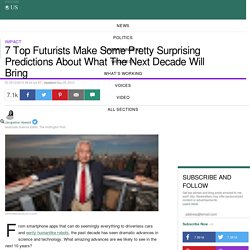
What amazing advances are we likely to see in the next 10 years? To find out, HuffPost Science reached out to seven top futurists — and they gave us some pretty surprising predictions. Keep reading to learn more. Dr. 5 Mind-Boggling Predictions for the Next 25 Years – Live Learn Evolve. Bill Gates calls Ray, “the best person I know at predicting the future of artificial intelligence.”

Ray is also amazing at predicting a lot more beyond just AI. This post looks at his very incredible predictions for the next 20+ years. So who is Ray Kurzweil? He has received 20 honorary doctorates, has been awarded honors from three U.S. presidents, and has authored 7 books (5 of which have been national bestsellers). He is the principal inventor of many technologies ranging from the first CCD flatbed scanner to the first print-to-speech reading machine for the blind.
In short, Ray’s pretty smart… and his predictions are amazing, mind-boggling, and important reminders that we are living in the most exciting time in human history. But, first let’s look back at some of the predictions Ray got right. Predictions Ray has gotten right over the last 25 years In 1990 (twenty-five years ago), he predicted… … that a computer would defeat a world chess champion by 1998.
Don’t Guess, Learn: Rapid Prototyping with Tom Chi [Video] “Doing is the best type of thinking.” – Tom Chi Tom Chi, CPO and head of X at Factory, is largely known for his work creating Google Glass, but arguably one of his largest contributions to the world has been unleashing the rapid prototyping framework and bringing it to organizations large and small.
![Don’t Guess, Learn: Rapid Prototyping with Tom Chi [Video]](http://cdn.pearltrees.com/s/pic/th/guess-learn-rapid-prototyping-117904062)
2015-16 SOF. By Jerome C.
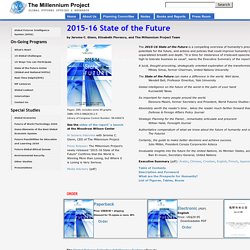
Glenn, Elizabeth Florescu, and The Millennium Project Team The Global Futures Collective Intelligence System offers the full version of the State of the Future with ongoing updates to the 15 Global Challenges plus access to all The Millennium Project research Individual – US$14.95/month (Purchase on GFIS) Individual – US$99.95/year Government – $850/year* Corporations – $2100/year* Universities, non-profit organization - $400/year * UN other international organizations - $799/year* * includes 10 users; additional users beyond 10 cost $25/year Subcribe here Table of Contents FOREWORD EXECUTIVE SUMMARY 1 GLOBAL CHALLENGES 15 1. Sustainable Development and Climate Change 18 2. Institute for Global Futures.
ThinkLikeFuturist. Mapping The Future. INTRODUCTION TO FUTURE STUDIES. Dr.
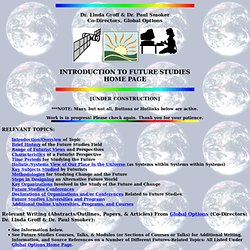
Linda Groff & Dr. Paul Smoker Co-Directors, Global Options ***NOTE: Many, but not all, Buttons or Hotlinks below are active. Work is in progress! Please check again. Futures studies. Moore's law is an example of futures studies; it is a statistical collection of past and present trends with the goal of accurately extrapolating future trends.
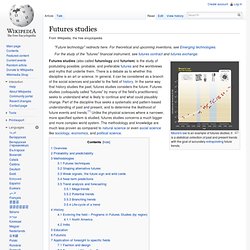
Futures studies (also called futurology and futurism) is the study of postulating possible, probable, and preferable futures and the worldviews and myths that underlie them. There is a debate as to whether this discipline is an art or science. The Future of Futures Studies. Today, the increasing number of futurists, scholars, business planners, and others in the futuring field is a good sign of the usefulness of Futures Studies for humanity, just as Dator wished so 26 years ago (Dator, 1986).
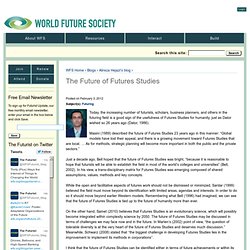
Masini (1989) described the future of Futures Studies 23 years ago in this manner: “Global models have lost their appeal, and there is a growing movement toward Futures Studies that are local. … As for methods, strategic planning will become more important in both the public and the private sectors.” Just a decade ago, Bell hoped that the future of Futures Studies was bright, “because it is reasonable to hope that futurists will be able to establish the field in most of the world’s colleges and universities” (Bell, 2002). In his view, a trans-disciplinary matrix for Futures Studies was emerging composed of shared assumptions, values, methods and key concepts.